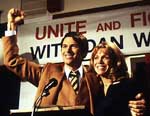
Rather than “going postal,” Dan White might be said to have “gone cop” or “gone firefighter.” He’d worked as both in San Francisco prior to his election to the Board of Supervisors, before he gunned down Mayor George Moscone and fellow supervisor Harvey Milk on November 27, 1978 – after which, because of the Twinkies he’d famously consumed, he was found guilty of voluntary manslaughter instead of murder. In a world bent out of shape, he was straight and square. He was also, as he saw it, stiffed. And he remains a blank and a blur, like a character in a Don DeLillo novel, a hollow drum on whom the century beats its dread. Even in Robert Epstein’s Oscar-winning documentary The Times of Harvey Milk (1984), White seemed to be missing in action. Execution of Justice (Sunday, November 28; 8 to 9:45 p.m.; Showtime), with a screenplay by Michael Butler based on trial transcripts and on Emily Mann’s disturbing 1986 theater piece, seeks to fill this empty space. But maybe he needs a Nashville.
Execution of Justice is a family affair. Tim Daly plays White, unable to connect his own dots. Amy Van Nostrand, who is married to Daly, plays White’s schoolteacher-wife, Mary Ann, a role as thankless on the small screen as it was in real life. Tyne Daly, Tim’s sister, plays Goldie Judge, an influential figure in District 8, who helps White in his first political campaign, then turns against him when White cuts a corrupt deal with a real-estate developer. Stephen Young plays the affable George Moscone, San Francisco’s first progressive mayor in decades. Peter Coyote turns on the afterburners as Harvey Milk, “the Mayor of Castro Street,” a born populist and the first openly gay elected official in America, who came to his crumb of power via the same new system of neighborhood representation that elected White. Shannon Hile is an eerie facsimile of Dianne Feinstein, who would graduate, from the Board of Supervisors and the tragedy, to Moscone’s job and then the Senate. And, fleetingly but memorably, Khalil Kain (Zooman, The Tiger Woods Story) plays the fictional transvestite Sister Boom Boom, all at once a nun on roller skates, a Greek chorus, and the voice crying out for justice – even vengeance – on behalf of the gay community.
Emily Mann’s Broadway play, while jumping back and forth in time, was basically a courtroom drama, verbatim transcript with echt-Brecht special effects – mixed media, back projections of Epstein’s documentary, etc. It’s easy enough to understand why screenwriter Butler and director Leon Ichaso (Sugar Hill), in an attempt to see the story through White’s eyes, tried something different – inventing lots of plausible flashback dialogue among White, his wife, and his lawyer, and among the principals in the backroom wheeling and dealing over a tax on property transfers that Moscone needed to balance his budget and White voted against because he thought the mayor had betrayed him. Trials tend not to tell us much about character, especially the character of the defendant, which has been recast for the adversarial purposes of the spectacle. What’s inadmissible is precisely what we miss.
But White isn’t any more accessible for in-depth analysis through his own eyes than through a jury’s. He botched his cop career, as he would botch his resignation from the Board of Supervisors, as he would botch his attempt to rescind that resignation. He was astounded to find that he would not be allowed to collect two checks from the city simultaneously, as a firefighter and a supervisor. He could be bought because he needed money for his growing family. And none of this was his fault. It just wasn’t fair. He had played the husband game, the father game, the career game, and the citizen game by the old rules. They, all those “social deviants and incorrigibles,” changed the rules and tricked him. So he got himself a gun.
And yet even as a homicidal homophobe, Dan White doesn’t really distinguish himself; he lacks symbolic heft. Since the dimwit couldn’t articulate his own feelings, we are left wondering whether Milk’s sexuality was incidental to his murder – whether the target wasn’t, instead, the modern world. In retrospect, his “Twinkie defense” doesn’t seem that much more preposterous than the “sexual panic” defense in the Matthew Shepard murder case. If only, after White got out on parole, a real-life Sister Boom Boom had exacted revenge – but no. Dan gassed himself in his own garage, after Mary Ann let him know just how far he’d let her down. Which leads us to further wonder why there are so few Sister Boom Booms, why the violence done to gays by straights is so seldom reciprocated.
This is an amazing amount to think about in a television movie.